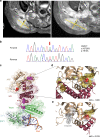Defective homologous recombination DNA repair as therapeutic target in advanced chordoma
- PMID: 30967556
- PMCID: PMC6456501
- DOI: 10.1038/s41467-019-09633-9
Defective homologous recombination DNA repair as therapeutic target in advanced chordoma
Abstract
Chordomas are rare bone tumors with few therapeutic options. Here we show, using whole-exome and genome sequencing within a precision oncology program, that advanced chordomas (n = 11) may be characterized by genomic patterns indicative of defective homologous recombination (HR) DNA repair and alterations affecting HR-related genes, including, for example, deletions and pathogenic germline variants of BRCA2, NBN, and CHEK2. A mutational signature associated with HR deficiency was significantly enriched in 72.7% of samples and co-occurred with genomic instability. The poly(ADP-ribose) polymerase (PARP) inhibitor olaparib, which is preferentially toxic to HR-incompetent cells, led to prolonged clinical benefit in a patient with refractory chordoma, and whole-genome analysis at progression revealed a PARP1 p.T910A mutation predicted to disrupt the autoinhibitory PARP1 helical domain. These findings uncover a therapeutic opportunity in chordoma that warrants further exploration, and provide insight into the mechanisms underlying PARP inhibitor resistance.
Conflict of interest statement
The authors declare no competing interests.
Figures


References
-
- Lebellec L, et al. Advanced chordoma treated by first-line molecular targeted therapies: Outcomes and prognostic factors. A retrospective study of the French Sarcoma Group (GSF/GETO) and the Association des Neuro-Oncologues d’Expression Française (ANOCEF) Eur. J. Cancer. 2017;79:119–128. doi: 10.1016/j.ejca.2017.03.037. - DOI - PubMed
Publication types
MeSH terms
Substances
LinkOut - more resources
Full Text Sources
Research Materials
Miscellaneous

